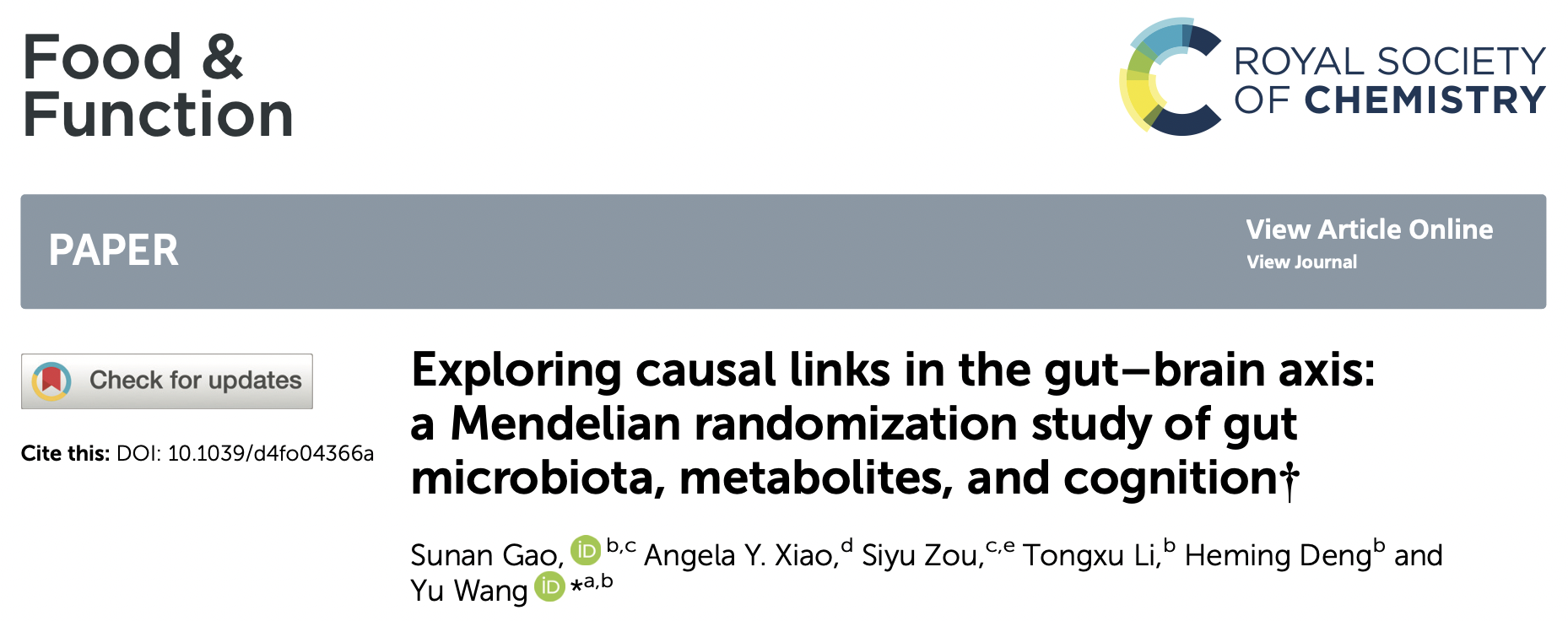Exploring causal links in the gut-brain axis: a Mendelian randomization study of gut microbiota, metabolites, and cognition
发布时间:2025-10-13浏览量:论文摘要:
The causal mediation effects of metabolites between gut microbiota and cognitive phenotypes remain unclear. Guided by the gut-brain axis mechanism, this study employed systematic Mendelian randomization (MR) to investigate these mediation pathways and their implications for functional food development. Univariate MR analysis was performed to estimate the causality of 211 gut microbial taxa (n = 18 340) and 452 serum metabolites (n = 7824) on general cognitive (n = 257 700), non-cognitive (n = 510 795), and specific cognitive phenotypes (n ≈ 2500) using genome-wide association study data. Inverse-variance weighted estimation was adopted as the primary method, with MR sensitivity analyses performed to complement the results. Metabolic pathway analysis was employed to enrich metabolic profiles, while two-step MR was used to screen mediation pathways. We revealed seven causal associations between microbiotas or metabolites and cognitive phenotypes (FDR < 0.05). Increased abundance of the order Clostridiales id.1863 was associated with better cognitive traits (OR = 1.14, 95%CI = 1.06-1.22), while 1-linoleoylglycerophosphoethanolamine was also positively associated with cognitive traits (OR = 1.61, 95%CI = 1.33-1.95). Seven significant metabolic pathways were enriched, including alpha-linolenic acid and linoleic acid metabolism, highlighting the potential role of omega-3 and omega-6 fatty acids in cognitive health. We further identified two significant mediation pathways linking the gut microbiota to cognitive phenotypes through metabolites. Notably, homostachydrine (39.1%) was found to mediate a proportion of the impact of the genus Turicibacter on emotion recognition (indirect effect: β = 0.105, 95%CI = 0.006-0.259, p = 2.60 × 10−2). This study provides evidence for causal relationships between gut microbiota, serum metabolites, and cognitive function, supporting the gut-brain axis mechanism. Our findings suggest potential targets for the development of functional food and personalized nutrition to improve cognitive health.
发表截图:

作者介绍

高溯楠,中国人民大学统计学院2022级硕士研究生,研究方向为老龄化,因果推断,多组学和加速度计数据等。相关成果发表在Food & Function, Journal of Affective Disorders、The Journals of Gerontology (Series A)、BMC Bioinformatics等期刊上。

Angela Y Xiao,牛津大学纳菲尔德医学系2024级硕士研究生,研究方向为公共卫生,相关成果发表在E Clinical Medicine、Health Education & Behavior、Food & Function等期刊上。

邹思雨,约翰斯霍普金斯大学布隆伯格公共卫生学院2023级硕士研究生,研究方向为心血管疾病、共患病和妇幼健康。相关成果发表在JACC Cardiovascular Imaging、npj Cardiovascular Health、BMJ Sexual & Reproductive Health、PLOS Medicine等期刊上。

李桐旭,中国人民大学统计学院2022级硕士研究生,研究方向为人群心理健康、老龄化、慢性病风险预测等。相关成果发表在Food & Function, Journal of Affective Disorders和International Journal of Environmental Research and Public Health.

邓和明,中国人民大学统计学院2022级硕士研究生,研究方向为人群心理健康,不平衡数据学习,因果关系识别等。相关成果发表在Food & Function, Journal of Affective Disorders,International Journal of Environmental Research and Public Health.

王瑜,中国人民大学统计学院副教授,北京生物医学统计与数据管理研究会副秘书长、国家食品药品监督管理总局医疗器械技术审评专家咨询委员会委员、中华预防医学会健康保险专业委员会委员、中国健康促进与教育协会主动健康分会委员。主要从事医疗保障、健康调查、老龄化、指数分析、医疗数据分析等方面的研究。研究论文发表在Food & Function、Journal of Affective Disorders、Public Health、BMC Public Health、Scientific Reports、PLoS One、BMC Health Services Research等杂志上。主持了国家社会科学基金项目、中国人民大学研究品牌计划基础研究项目等。
